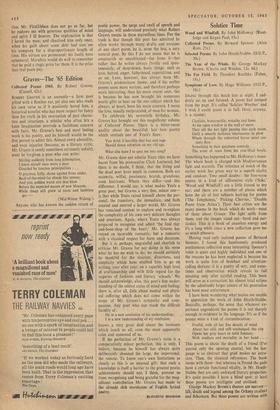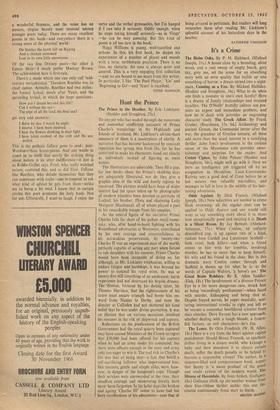Solstice Time
IDLING through this batch late at night, I sud- denly sat up and listened. A poem had jumped from the page. It's called 'Solstice Weather' and I wish I could quote it in full. Here., anyway, is a stanza: Clematis, honeysuckle, wreathe and fume At the open window in the wall of snow. They sift the hot light passing into each room, Until a smooth darkness interweaves its glow Where through the unhurried house quiet cur-
rents flow.
Something in their quietness controls The scent of roses from the rose-filled bowls.
Something has happened to Mr. Holloway's muse. The whole book is charged with Mediterranean light and warmth. The reticence of much of the earlier work has given way to a superb clarity and candour. Two small doubts: the free-verse poems in a kind of alliterative style ('Solo,' 'Wood and Windfall') are a little forced to my ear; and there are a number of pieces which have the air of lost subjects looking for poems ('The Telephones,' Picking Cherries,' Double Poem from Attica'). Their best critics are the many poems in the book which do work—most of them about Greece. The light spills from them, and the images stand out—hard and par- ticular. This is a book of ceaseless energy and it's a long while since a new collection gave me so much pleasure.
Having read only isolated poems of Bernard Spencer, I found this handsomely produced posthumous collection most interesting. Spencer's voice is quiet and highly individual and one of the reasons he has been neglected is because his work is quite free of bombast and attention- calling devices; it is a poetry of wry, and some- times sad observation which reveals its full meaning only after careful reading. This book will serve as a correction; his almost total eclipse by the admittedly larger talents of his generation has been most unfortunate.
I have been wondering what makes me unable to appreciate the work of John Heath-Stubbs. Basically, perhaps, the sense that whatever ex- perience engendered the poems it is not sharply enough in evidence in the language. It's as if the poems were a kind of circumlocution:
Fretful, with all her fine deceits of mind About her still, and still unchanged, the city Opens her grey heart to mild January, With medlars and mortality in her hand . . .
This poem is about the death of a friend (I've quoted only the opening stanza), but the lan- guage is so abstract that grief makes no intru- sion. Then, the classical references. The book teems with them---but whereas in. Pound the gods have a certain functional vitality, in Mr. Heath- Stubbs they are only awkward literary properties. It's quite possible I have a blind spot; at least these poems are intelligent and civilised. George Mackay Brown's themes are narrow- -- life, death and legend among the Orkney crofters and fishermen. But these poems are written with
a wonderful firmness, and the voice has an austere, elegiac beauty most unusual among younger poets today. There are many excellent poems in this book—and everywhere there is a strong sense of the physical world:
On Sunday the hawk fell on Rigging And a chicken screamed Lost in its own little snowstorm. . . .
Of the two fine Orkney poets—the other is Edwin Muir—I much prefer Mackay Brown. The achievement here is first-rate.
There's a mode which one can only call 'mid- century metaphysical.' Theodore Roethke was its chief cantor. Actually, Roethke had two styles: the formal lyrical, much after Yeats, and the sprawling lyrical, in which the huge questions:
How can I dream beyond this life? Can I outleap the sea—
The edge of all the land, the final sea?
get very odd answers: I thirst by day. 1 watch by night.
I receive. I have been received.
I hear the flowers drinking in their light.
I have taken counsel of the crab and the sea- urchin. . . .
This is the pathetic fallacy gone to seed: post- Wordsworthian hocus-pocus.. And one wants to assert in its teeth that surely the striking thing about nature is its utter indifference—it just is as Robbe-Grillet says. Frost, who really watched nature, captured this, and so did Eliot. Fellows like Roethke, who delude themselves that they can commune with crabs—one-i4 tempted to ask what kind of advice he gets from them—strike me as being a bit mad. I know that in certain circles this poet produces the holy hush. Not for me. Ultimately, I want to laugh. I enjoy the verve and the verbal gymnastics, but I'm hanged if I can take it seriously. Oddly enough, when he stops taking himself seriously—as in 'Elegy' —he can be very amusing. But this kind of poem is all too rare in the book.
Hugo Williams is young, well-travelled and urbane. In this, his first book, he shapes his experiences of a number of places and moods with a terse, emblematic precision. There is no fuss, no rhetoric; the tone is always quiet and assured. This is a very engaging first collection —and we are bound to see more from this writer. In particular, I like 'The Pool Player,' Lie' and 'Beginning to Go'—and 'Scars' is excellent.
KEITH HARRISON







































 Previous page
Previous page